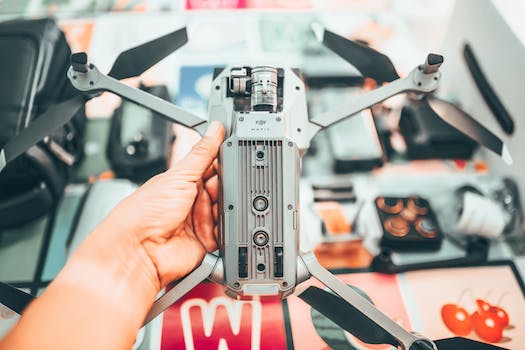Business Opportunities For Drone Pilots
“Take your drone skills to new heights with endless business opportunities.”
Introduction
Drone technology has revolutionized various industries, including photography, agriculture, and construction. With the increasing demand for drone services, there are numerous business opportunities for drone pilots. In this article, we will explore some of the most lucrative business opportunities for drone pilots.
Top 10 Industries That Can Benefit from Drone Services
Drones have become increasingly popular in recent years, and their use is not limited to just hobbyists and enthusiasts. Drone technology has opened up a world of opportunities for businesses across various industries. Drone pilots can provide a range of services, from aerial photography and videography to surveying and mapping. In this article, we will explore the top 10 industries that can benefit from drone services.
1. Real Estate
Real estate agents can use drones to capture stunning aerial footage of properties they are selling. This footage can be used to create virtual tours, giving potential buyers a better idea of the property’s layout and surroundings. Drones can also be used to inspect roofs and other hard-to-reach areas, saving time and money on inspections.
2. Agriculture
Drones can be used in agriculture to monitor crops and livestock. They can provide farmers with valuable data on crop health, soil moisture levels, and pest infestations. This information can help farmers make informed decisions about when to water, fertilize, and harvest their crops.
3. Construction
Drones can be used in construction to survey job sites and monitor progress. They can provide builders with accurate measurements and 3D models of buildings, helping them to plan and execute projects more efficiently. Drones can also be used to inspect hard-to-reach areas, such as roofs and scaffolding.
4. Insurance
Insurance companies can use drones to assess damage after natural disasters and other events. Drones can provide insurers with high-resolution images and videos of damaged properties, helping them to process claims more quickly and accurately.
5. Mining
Drones can be used in mining to survey sites and monitor progress. They can provide miners with accurate measurements and 3D models of mines, helping them to plan and execute projects more efficiently. Drones can also be used to inspect hard-to-reach areas, such as tunnels and shafts.
6. Oil and Gas
Drones can be used in the oil and gas industry to inspect pipelines and other infrastructure. They can provide companies with high-resolution images and videos of their assets, helping them to identify potential problems before they become major issues.
7. Search and Rescue
Drones can be used in search and rescue operations to locate missing persons and assess disaster areas. They can provide first responders with valuable information on the location and condition of victims, helping them to plan and execute rescue operations more efficiently.
8. Wildlife Conservation
Drones can be used in wildlife conservation to monitor animal populations and track their movements. They can provide conservationists with valuable data on animal behavior and habitat, helping them to make informed decisions about conservation efforts.
9. Film and Television
Drones can be used in film and television production to capture stunning aerial footage. They can provide filmmakers with unique perspectives and angles, helping them to create more engaging and visually appealing content.
10. Delivery
Drones can be used in delivery services to transport small packages and goods. They can provide companies with a faster and more efficient way to deliver goods, especially in hard-to-reach areas.
In conclusion, drone technology has opened up a world of opportunities for businesses across various industries. Drone pilots can provide a range of services, from aerial photography and videography to surveying and mapping. The industries listed above are just a few examples of how drones can be used to improve efficiency, save time and money, and provide valuable data and insights. As drone technology continues to evolve, we can expect to see even more innovative uses for drones in the future.
How to Start a Drone Business: A Step-by-Step Guide

Drones have become increasingly popular in recent years, and with their rise in popularity comes a plethora of business opportunities for drone pilots. If you’re interested in starting a drone business, there are a few steps you can take to get started.
Step 1: Get Certified
Before you can start a drone business, you need to become a certified drone pilot. The Federal Aviation Administration (FAA) requires all drone pilots to pass a test and obtain a Remote Pilot Certificate. The test covers topics such as airspace regulations, weather, and drone operations. Once you pass the test, you’ll receive your certificate, which allows you to legally operate a drone for commercial purposes.
Step 2: Choose Your Niche
There are many different niches within the drone industry, so it’s important to choose one that aligns with your interests and skills. Some popular niches include aerial photography and videography, surveying and mapping, agriculture, and inspection services. Consider your strengths and what you enjoy doing to determine which niche is right for you.
Step 3: Invest in Equipment
Once you’ve chosen your niche, it’s time to invest in equipment. The type of equipment you’ll need will depend on your niche, but at a minimum, you’ll need a drone, a camera, and a computer for editing and processing footage. It’s important to invest in high-quality equipment to ensure that you’re able to provide your clients with the best possible service.
Step 4: Build Your Portfolio
Before you can start attracting clients, you need to build a portfolio of your work. This can be done by offering your services to friends and family for free or at a discounted rate, or by creating your own projects to showcase your skills. Your portfolio should showcase your best work and demonstrate your ability to provide high-quality services to clients.
Step 5: Market Your Business
Once you have a portfolio, it’s time to start marketing your business. This can be done through social media, networking events, and online directories. It’s important to have a strong online presence, including a website and social media accounts, to make it easy for potential clients to find you. You can also reach out to businesses in your niche to offer your services.
Step 6: Provide Excellent Customer Service
Providing excellent customer service is key to building a successful drone business. This includes being responsive to client inquiries, delivering projects on time, and providing high-quality work. It’s important to communicate clearly with clients throughout the entire process to ensure that their needs are being met.
Starting a drone business can be a rewarding and lucrative venture for those who are passionate about drones and have the skills to provide high-quality services to clients. By following these steps, you can start your own drone business and take advantage of the many opportunities available in this growing industry.
The Future of Drone Technology and Its Impact on Business Opportunities
Drones have become increasingly popular in recent years, and their use is not limited to just hobbyists and enthusiasts. The technology has advanced to the point where drones are now being used in various industries, including agriculture, construction, and even delivery services. This has opened up a whole new world of business opportunities for drone pilots.
One of the most significant impacts of drone technology on business opportunities is in the field of agriculture. Drones equipped with cameras and sensors can be used to monitor crops, identify areas that need attention, and even spray pesticides and fertilizers. This not only saves time and money but also reduces the need for manual labor, making it a more efficient and cost-effective solution for farmers.
Another industry that has seen a significant impact from drone technology is construction. Drones can be used to survey construction sites, create 3D models, and monitor progress. This allows for more accurate planning and reduces the risk of errors, ultimately saving time and money. Additionally, drones can be used to inspect buildings and structures, identifying any potential issues before they become major problems.
Delivery services have also been revolutionized by drone technology. Companies like Amazon and UPS are already testing drone delivery services, which could potentially reduce delivery times and costs. This opens up a whole new market for drone pilots, who could be hired to operate and maintain these delivery drones.
The use of drones in the film and photography industry has also become increasingly popular. Drones equipped with high-quality cameras can capture stunning aerial footage that was previously only possible with expensive helicopters or planes. This has created a new market for drone pilots who specialize in aerial photography and videography.
The potential uses for drones in various industries are endless, and as the technology continues to advance, so do the business opportunities for drone pilots. However, it is important to note that operating a drone for commercial purposes requires a license from the Federal Aviation Administration (FAA). The FAA has specific regulations and guidelines that must be followed, including obtaining a Remote Pilot Certificate and registering the drone.
In addition to obtaining the necessary licenses and certifications, drone pilots must also have a solid understanding of the technology and its capabilities. This includes knowledge of the different types of drones, their capabilities, and how to operate them safely and effectively. It is also important to stay up-to-date on the latest regulations and guidelines, as they are constantly evolving.
In conclusion, the future of drone technology is bright, and the potential business opportunities for drone pilots are vast. From agriculture to construction, delivery services to film and photography, drones are changing the way we do business. However, it is important to approach this industry with caution and responsibility, ensuring that all regulations and guidelines are followed to ensure safe and effective operation. With the right skills, knowledge, and certifications, drone pilots can take advantage of this exciting new market and build a successful career in the drone industry.
Marketing Strategies for Drone Pilots: How to Attract More Clients
As the use of drones continues to grow, so do the business opportunities for drone pilots. Whether you’re a seasoned professional or just starting out, there are plenty of ways to attract more clients and grow your business. In this article, we’ll explore some marketing strategies for drone pilots that can help you stand out from the competition and build a successful business.
First and foremost, it’s important to have a strong online presence. This means having a professional website that showcases your work and services. Your website should be easy to navigate and include high-quality photos and videos of your drone work. You should also include information about your experience and qualifications, as well as any certifications or licenses you hold.
In addition to your website, you should also have a presence on social media. Platforms like Instagram and Facebook are great for sharing your work and connecting with potential clients. Make sure to post regularly and engage with your followers by responding to comments and messages.
Another effective marketing strategy for drone pilots is to network with other professionals in your industry. This could include real estate agents, construction companies, and event planners. Attend industry events and conferences, and make an effort to connect with other professionals in your field. You never know when a collaboration or referral could lead to new business opportunities.
When it comes to attracting clients, it’s important to be clear about the services you offer and the value you provide. Make sure your pricing is competitive and transparent, and be upfront about any additional fees or charges. You should also be willing to provide references or testimonials from satisfied clients.
One way to differentiate yourself from other drone pilots is to specialize in a particular niche. For example, you could focus on aerial photography for real estate listings, or provide drone inspections for construction sites. By specializing in a particular area, you can become known as an expert in your field and attract clients who are specifically looking for your services.
Finally, don’t underestimate the power of word-of-mouth marketing. Encourage your satisfied clients to refer you to their friends and colleagues, and make sure to follow up with them after each job to ensure their satisfaction. You could also offer incentives for referrals, such as a discount on their next job or a free add-on service.
In conclusion, there are many marketing strategies for drone pilots that can help you attract more clients and grow your business. By having a strong online presence, networking with other professionals, specializing in a particular niche, and providing excellent customer service, you can differentiate yourself from the competition and build a successful drone business.
Legal Considerations for Drone Pilots: Understanding FAA Regulations and Insurance Requirements
As the use of drones continues to grow, so does the demand for skilled drone pilots. Whether you’re looking to start your own drone business or simply want to offer your services as a freelance pilot, there are plenty of opportunities out there. However, before you take to the skies, it’s important to understand the legal considerations that come with being a drone pilot.
The Federal Aviation Administration (FAA) has established regulations for drone pilots to ensure safety and privacy. These regulations apply to both commercial and recreational drone use. As a drone pilot, it’s your responsibility to understand and follow these regulations.
One of the most important regulations for drone pilots is the requirement to obtain a Remote Pilot Certificate. This certificate is issued by the FAA and demonstrates that you have the knowledge and skills necessary to operate a drone safely. To obtain a Remote Pilot Certificate, you must pass an aeronautical knowledge test and undergo a background check.
In addition to obtaining a Remote Pilot Certificate, drone pilots must also follow specific rules when operating their drones. For example, drones must be flown below 400 feet and within visual line of sight of the pilot. Drones are also prohibited from flying over people or moving vehicles, and they must be flown during daylight hours.
Another important consideration for drone pilots is insurance. While not required by law, insurance can protect you in the event of an accident or damage to property. There are a variety of insurance options available for drone pilots, including liability insurance and hull insurance.
Liability insurance covers damage or injury caused by your drone, while hull insurance covers damage to the drone itself. It’s important to carefully consider your insurance needs and choose a policy that provides adequate coverage for your specific situation.
In addition to FAA regulations and insurance requirements, drone pilots must also be aware of state and local laws. Some states and municipalities have established their own regulations for drone use, which may be more restrictive than FAA regulations. It’s important to research and understand these laws before flying your drone.
Overall, understanding the legal considerations for drone pilots is essential for anyone looking to operate a drone for commercial or recreational purposes. By obtaining a Remote Pilot Certificate, following FAA regulations, and obtaining insurance, you can ensure that you’re operating your drone safely and responsibly. With the right knowledge and skills, there are plenty of business opportunities available for drone pilots.
Conclusion
Business opportunities for drone pilots are increasing rapidly as the demand for aerial photography, surveying, and inspection services continues to grow. With the ability to capture high-quality images and data from above, drones are becoming an essential tool for a wide range of industries, including real estate, construction, agriculture, and more. As the technology continues to advance and regulations become more favorable, the potential for drone pilots to start their own businesses or work for established companies is only going to increase. Overall, the future looks bright for those interested in pursuing a career in drone piloting.






